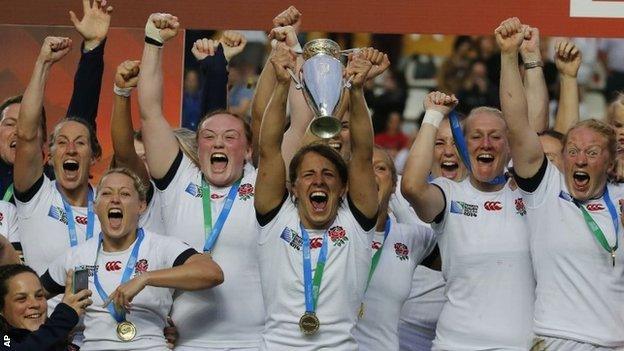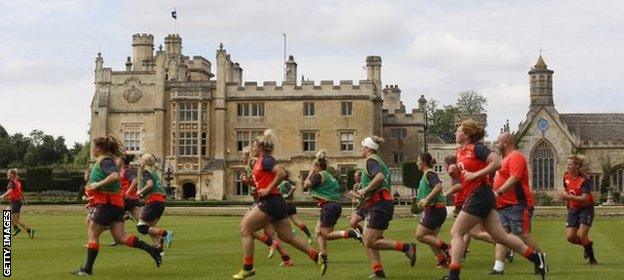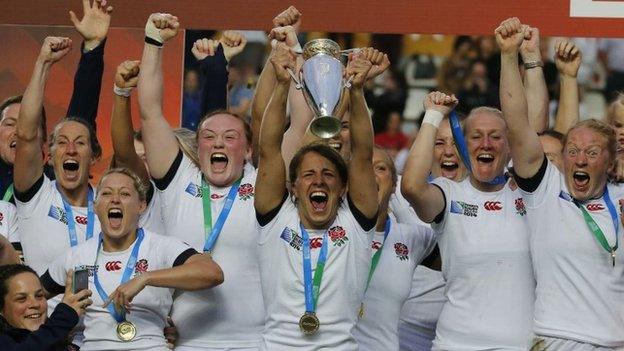Women's Rugby World Cup 2017: End of England XVs contracts 'a backwards step'
- Published

England won the Women's Rugby World Cup for the first time in 20 years in 2014
The decision not to renew contracts for world champions England's 15-a-side women's team is a backward step, says former international Vicky MacQueen.
The Rugby Football Union (RFU) says its focus will switch to the sevens game after this year's World Cup in Ireland, which starts next month.
"I feel a little bit gutted for the girls and the sport as a whole," former full-back MacQueen told BBC Sport
It is understood several current squad members will move to sevens contracts.
New XVs contracts will then be awarded in preparation for the 2021 Women's Rugby World Cup.
"It's a shame for the sport that it's not going to be moving forward. Why can't the focus be on both disciplines? They are two totally different games," said MacQueen, who was capped 34 times for England between 2004 and 2009.
"It's a bit of a backward step. Those contracted girls have been focused fully on rugby - they are now going to have to balance it with their job again."
World Cup winner Maggie Alphonsi told BBC Radio 5 live there should be more investment in the game.
"The RFU do pump a lot of money into the women's game, which is fantastic," said former England player Alphonsi, who retired in 2015.
"But it's frustrating and disappointing to see there's not an emphasis on both forms of the game - sevens and XVs."
There is support for women's rugby but it’s just not enough - Alphonsi
England, who won the World Cup for the first time in 20 years in 2014, begin their defence against Spain in Dublin on 9 August.
The contract news emerged at a time when there is increased focus on women's sport, with England lifting the Women's Cricket World Cup at Lord's and the football side winning their first two matches at Euro 2017.
England named a 28-player squad in June for next month's rugby tournament.
Fifty England players are on a mixture of full-time and part-time professional contracts, and only 17 full-time professional fixed-term deals are set to be handed out in September, purely for the sevens programme.
Current contracts include:
17 full-time fixed-term (season-long) deals - 15 XVs players, two sevens
17 short-term contracts for XVs players, mainly around specific tournaments
11 part-time sevens contracts
Five ad-hoc contracts for both XVs and sevens
The RFU, which last year announced record revenues of more than £400m, says its priorities are cyclical and shift between the XVs and sevens programmes, with the Rugby World Cup Sevens and Commonwealth Games taking place next year.
It says the XVs side will continue to take part in competitions including the Women's Six Nations, and stresses it has invested millions of pounds in the women's game, including £800,000 annually on a new domestic club competition aimed at increasing and improving the talent pool available for selection for England.
"The women's squad were always aware that contracts would end in September, after the World Cup," said RFU director of professional rugby Nigel Melville.
"The current XVs squad was informed in April that the next contracts will be focused on sevens, reflecting the cyclical nature of the women's game. The squad fully understands the position and are focused on the World Cup in Ireland next month."

England's women training in Bath earlier this month
The move was criticised by two female Labour MPs.
Barbara Keeley, MP for Worsley and Eccles South, called it "a shameful decision" and Gower MP Tonia Antoniazzi - a former Wales rugby international - said on Twitter: "Another huge blow for women with contracts being slashed by England RFU."
MacQueen said it raises the prospect of a World Cup winner this summer being without a full-time contract.
"Can you imagine that? Going from the absolute pinnacle of your career to be suddenly dropped back to earth - you've got to go back to work and do your normal job tomorrow, and try to fit your training around it," she said
"I'm pretty confident the girls will be so focused on the job in hand that it won't affect their performance, but it's a big blow for their future. Quite a few of them have given up good careers to concentrate on rugby. Suddenly it's going to be taken away from them again.
"It means the women's game goes back to being professional with a 'little p' again."
- Published24 July 2017

- Published17 August 2014
